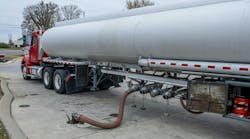Located in West Africa, Nigeria is the fifth largest supplier of oil to the United States and an outbreak of fighting amongst rival tribes and Nigeria's government have effectively crippled its ability to produce and export oil.
What CNN has called "tribal warfare" in Nigeria since March 12 has killed 75 people and forced petroleum producers Chevron-Texaco, Royal Dutch Shell, and French-owned TotalFinalElf to shut down their operations, reducing Nigeria's exports by over 767,500 barrels a day -- over one-third of the country's exports.
Though oil prices per barrel have dropped 25% since U.S.-led forces invaded Iraq last week and secured most of its oilfields without major damage, the worsening situation in Nigeria forced prices up $1.30 a barrel so far this week.
With worldwide oil prices dropping to just under $29 a barrel from over $38 last week, trucking companies suffering from record high diesel fuel prices in the U.S. had hoped for a break. With average diesel prices over $1.70 per gallon in the U.S., trucking operators large and small have been feeling the pinch.
"Fuel is a major expense for motor carriers, ranging from 10 to 30% of operating expenses depending on the type and size of the company," said American Trucking Assn. CEO Bill Graves. "For most trucking companies, fuel is the second highest expense after labor. Already this year, compared to the same time last year, we've paid more than $1 billion in additional fuel costs. These additional costs are having a dramatic effect on the industry."
Oil prices have exploded recently, rising from $18 a barrel to nearly $40 a barrel in just one year, as the possibility of war with Iraq and a more than two-month long strike by Venezuela's oil industry cut available supplies.
Venezuela, the world's fourth largest oil producer, supplied the U.S. with 14% of its oil imports but its daily oil production of over three million barrels per day dwindled to just over 500,000 barrels a day until the strike came to an unheralded end in mid-February.
Now the unrest in Nigeria may fan the shortage again, experts warned.
"This has been building for months, but it has been tremendously overshadowed by events in Venezuela, then Iraq and the cold winter we've had," John Kilduff, senior vp of energy risk management for Fimat USA, told The Houston Chronicle. "Nigeria is a key source of supply, and in this kind of situation, we need every barrel," he said.


